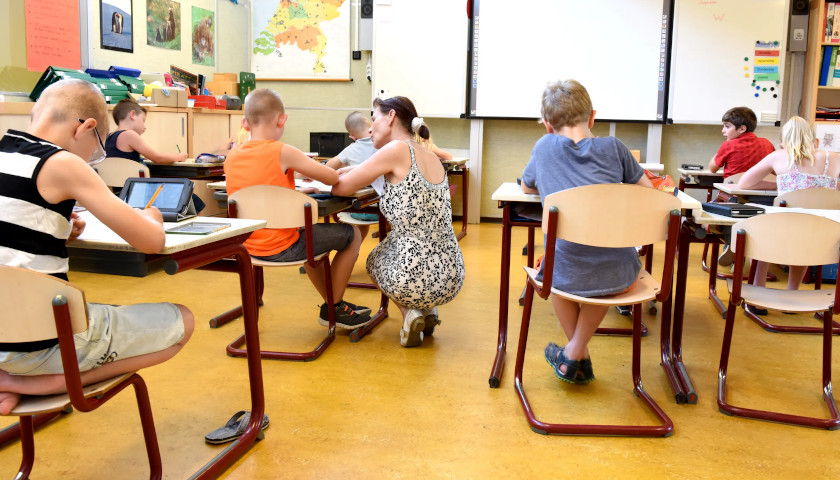Facing pressure from teacher’s advocacy groups, school districts across Virginia are reconsidering plans to return to in-person learning. Districts including Henrico County, Fairfax County, and Virginia Beach are canceling or postponing in-person learning options, according to reporting by NBC12 and Wavy.com. Other districts, including Chesterfield County and Loudoun County, are considering similar moves, according to ABC7 and WRIC. On Sunday, a group of Northern Virginia teachers’ associations wrote a letter citing rising COVID-19 cases and state guidance about limiting group size as a reason for postponing plans.
“It continues to be clear that Northern Virginia is past the point of safe metrics for in-person learning in our school buildings,” the authors state. “In district after district there are plans to send our youngest and most vulnerable students into classrooms and buildings in spite of international evidence that it has the propensity to cause a surge in the pandemic.”
However, a study published on November 12 in the Journal of the American Medical Association examined the potential loss of life linked to poorer education caused by COVID-19 school closures at the end of the 2019-2020 school year. The results suggested that although the school closures likely saved some lives, that benefit comes at the cost of life expectancy of children in those schools.
“The public debate has pitted ‘school closures’ against ‘lives saved,’ or the education of children against the health of the community. Presenting the tradeoffs in this way obscures the very real health consequences of interrupted education,” the study states. “These consequences are especially dire for young children. There is little reason to believe that virtual learning environments can be effective for primary school–aged children.”
The authors concluded that there is a potential “lack of intergenerational health equity” and that closed schools cause an extra harm to at-risk students.
“We believe that during the COVID-19 pandemic, the United States has extracted an enormous sacrifice from its youngest citizens to protect the health of its oldest,” the study concludes.
“During a pandemic, this may well be an ethically defensible tradeoff, but only if resources are invested to reverse the potential damage to health and education that this strategy may inflict on a population with low visibility and high vulnerability,” the authors state.
Other studies have found more immediate harm potentially linked to the school closures. A study published on November 13 in the CDC’s Mental and Mortality Weekly Report found that there is a higher proportion of children making mental health-related emergency department visits, according to the American Academy of Pediatrics.
“Many mental disorders commence in childhood, and mental health concerns in these age groups might be exacerbated by stress related to the pandemic and abrupt disruptions to daily life associated with mitigation efforts, including anxiety about illness, social isolation, and interrupted connectedness to school,” study authors wrote.
Reporting by The 74 Million suggests that suicide among youths could rise because of social isolation during the pandemic.
Meanwhile schools, parents, and officials struggle to develop policies that balance these concerns.
In a press release, the Arlington Parents for Education (APE) wrote, “The risks for Covid in schools are manageable; we have seen that throughout the country. The risks associated with kids being out of school, however, are escalating rapidly.”
Virginia Beach parent Liz Lindsay wrote in a Facebook comment that her first grade student was crying because she had to return to Zoom classes. “These decisions are not based on ‘science’ – it’s politics and it’s appalling. Last I checked we lived in the land of opportunity.”
In Henrico, Facebook commenters reacted to the district’s decision to delay expanding in-person learning. Kelly Lipford said, “Thank you for playing it smart, and not ignoring the sharp spike in cases. Hopefully people will also be smart over the holidays, and we won’t see this trend continue.”
Other commenters criticized the district. Kate Konrad asked, “So when will teachers ever want to go back to work? I’m not trying to be mean, I’m honestly curious? [Because] this clearly is no way for our children to continue to live.”
The APE press release continues, “There will never be a world without risk. At some point, our communities will have to learn to live in a world where Covid exists and children go to school. Otherwise, there will never be a world where children go to school.”
– – –
Eric Burk is a reporter at The Virginia Star and the Star News Digital Network. Email tips to [email protected].





[…] have warned that virtual learning carries its own risks. Studies show increases in child mental health-related emergency room visits during COVID-19. Other studies suggest that […]